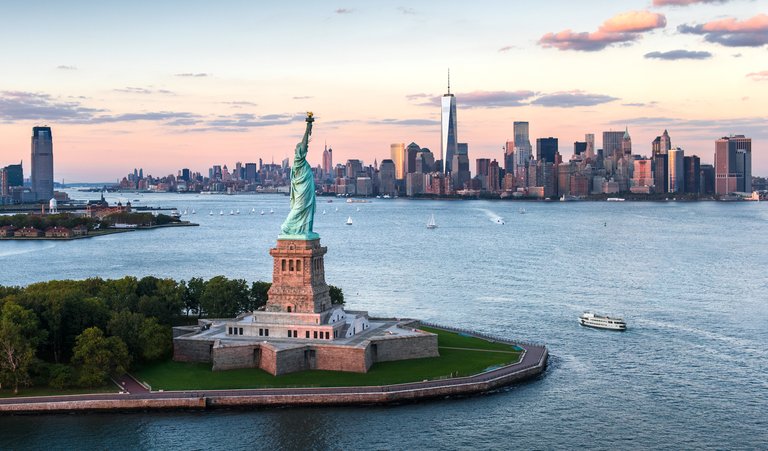
No one knows when or where the first Americans settled, but archaeologists discovered that the human life and culture originated somewhere in Ethiopia and spread across the entire world. The first people to settle in America were nomadic Asian hunters, walking across the continents between 20,000 and 40,000 years ago. Now we call these people Native Americans or Indians.
After the arrival of Columbus in1492, European people settled in and dominated the United States. During this period of time, those immigrants also built new and independent nations in North and South America. When the economy was strong, immigrants were generally accepted. However, the weak economy gradually brought strong anti-immigration beliefs, including the spread of racism.
Since then, immigrants were attacked and banned from entering the United States. For example, in 1882 the first laws banned immigrants from China, and in 1908 banned Japanese immigrants. But are immigrants really hurting the United States or our economy? After many years passed in 1965, the United States revised a new immigration law that made it possible for millions of immigrants to enter the country. Since then, millions of immigrants poured into the United States.

Believe it or not, in today’s world so many people see America as a land of opportunity-the land of milk and honey and the Promised Land. For many people, moving to the United States represents a higher quality of life and freedom of expression. Whatever the reason people move to United States, it reflects a fresh start in one of the most powerful and respected countries in the world, that makes everything so much easier for highly-skilled immigrants to start a new life and make their dreams come alive. The most significant issue is to come legally to the country and be productive.

People move to the United States for variety of reasons, such as religious and political, but the backbone of most immigrations are economic reasons that drove educated immigrants to leave their original homeland and brought them to the United States. Even though highly educated immigrants are a key part of the American success story since 1492, and because of creating economic growth and jobs for U.S.-born workers, they are not receiving the credits they really deserve. Because of this reason they are returning to their homeland.
There are many paths that can be taken in order to encourage U.S.-educated and highly-skilled foreigners to stay in the United States, to create business, to use their talents, skills and ambitions. These paths could be helping their dream to become a reality by providing citizenship and permanent residency for who want to stay in the United States and contribute to our economy. Opening our doors much wider to highly skilled immigrants should be our priority and a cornerstone of our growth policy.
Do skilled immigrants contribute to productivity growth? According to many researchers, the answer is a clear, yes. Encouraging more high-skilled foreigners to work in the United States shouldn’t only be an idea promoted by the president, but also by the people of United States. Skilled foreigners are good for our growth. They can conduct research in our universities, start businesses, and join corporations. Their business and work ethic will boost our economy in the long run.
Many natural-born citizens worry over immigrants causing fewer jobs for Americans. This is not the case. On the contrary, they will create jobs for Americans—in large corporations and new companies alike. Large companies that hire skilled immigrants tend to hire more U.S. citizens as well. According to Bill Gates (2007) quote in Kerr, “Microsoft has testified that for every immigrant hired at Microsoft, averages of four non-immigrant employees are hired.” They are not only working but they create more jobs for Americans.

According to George (1995), “The 21st century global economy high skilled immigrants and entrepreneurs are very valuable and in high demand. Immigration in the United States is a very heated debate.” The current outlook of Americans toward educated and highly skilled immigrants needs to be changed because most Americans believe that highly- skilled and educated foreigners steal their jobs from U.S. workers.
Many skilled immigrants who come to the U.S. start new businesses and create jobs. According to Hainmuller (2010), “Immigrants owned 28 percent of all new U.S. businesses. Notably, more than 40 percent of Fortune 500 companies were founded by immigrants or children of immigrants. These American companies represent 7 of the 10 most valuable brands globally, collectively employ more than 10 million people and generate annual revenue of $4.2 trillion.”
These gains could be increased considerably if the United States pursued an immigration policy which attracted a more skilled immigrant flow. Skilled immigrants increase our economic proficiency by lowering labor shortage in low and high skilled markets because their education backgrounds fill holes in the native-born market. Increasing immigration would expand the American work force, and cause more business to grow again.
As our population ages and shrinks, highly educated and skilled immigrants will become increasingly important to the U.S. economy. According to a 2007 study by Jacob Funk Kirkegaard of the Peterson Institute of International Economics, the skill levels of U.S. workers are stagnating relative to the rest of the world. As a result, “when American baby boomers retire, they will take as many skills with them as their children will bring into the U.S. workforce. These demographic trends—combined with the growing international competition for skilled workers—suggest that in the coming decade, America could face broad and substantial skill shortages.”
In the past decade, the share of doctoral-degree recipients in science and engineering from China and India who report definite plans to stay in America has been falling. A recent survey by Duke University researchers found that most of Indian immigrants who returned to their homeland country said that opportunities to start their own businesses were "better" or "much better" there than in the U.S.
Skilled foreigners can grow our economic proficiency by decreasing labor shortages in high skilled labor markets because their educational backgrounds fill the space in the native born labor market. Increasing the number of skilled immigrants could expand the American labor-force, and facilitate more business to grow again. Spreading the truth about educated foreigners can completely change people’s perspectives in today’s society.
Some of America's well recognized brands, such as: AT&T, Ford, P&G, Budweiser, GE, Mattel, McDonald’s, and The Walt Disney Company were created by immigrants and their children. Furthermore, the new generation of technology powerhouses on the Fortune 500 list: Apple, Sun, Intel, eBay, Google, Yahoo!, and Qualcomm were all founded by immigrants. Additionally, growing fields, like medical devices and semiconductors, are full of immigrant-founded companies.

Additionally, according to Saxenian, “Silicon Valley's workforce is among the world's most ethnically diverse. Not only do Asian and Hispanic workers dominate the low-paying, blue-collar workforce, but foreign-born scientists and engineers are increasingly visible as entrepreneurs and senior management.” Understandably, the fast growth of the foreign-born workforce has evoked debates over U.S. immigration policy, both here and in the developing world countries. More than a quarter of Silicon Valley's highly educated workers are foreign, including tens of thousands from lands as diverse as Taiwan, India, the United Kingdom and China.
Those immigrants not only transformed our economy, and science, and technology but also they change the world. Additionally, immigrants have proven to be America's valuable advantage from the techies who created icons of the new economy such as Intel, Google, eBay and Sun Microsystems to the young engineers tinkering with solar power and next-generation car batteries.

It is easy to understand the attractiveness of high-skilled immigrants to the highly developed economies. One great economy consist of three factors of productions: high-skilled workers, low-skilled workers and physical capital.
In a fundamental sense, these three factors of production are also complements in production. More of any one factor of production increases the productivity of the other two factors. For example, more high-skilled professionals increase the productivity (and hence the demand) for the lower-skilled workers who assist them in the production process, as well as increasing the productivity of capital. Thus, while the immigration of high-skilled workers tends to lower the marginal product, and hence wages, of high-skilled native-born workers, it also raises the productivity of low-skilled workers and capital.